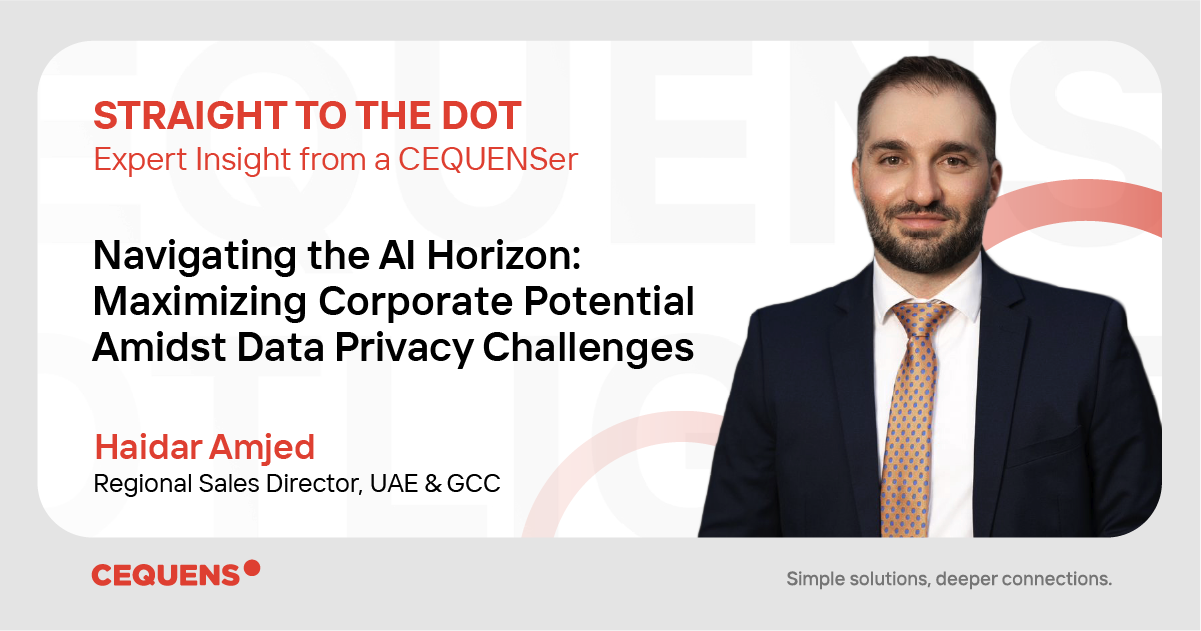Meet Haider Amjed, the driving force behind CEQUENS's regional sales success in the UAE and GCC. With a passion for nurturing business growth, Haider is known for crafting winning strategies and fostering lasting client relationships. His expertise in diverse industries and leadership in high-performing teams make him the secret sauce for sustained market dominance. Before CEQUENS, Haider's trailblazing career included pivotal roles at DigiCert, IBM, and Symantec, where his sales prowess reshaped regional landscapes.
In this interview, he shares trends in data privacy and what clients need to do to protect their Personally Identifiable Information (PII).
What are the main worries organizations have when integrating AI providers with their backend systems, particularly concerning data security, regulatory compliance, and seamless integration?
When it comes to incorporating AI into backend systems, organizations really sweat the security of sensitive data. They want solid measures for processing, transferring, and storing data securely. Compliance with data protection laws, like GDPR and CCPA, is a big deal to avoid legal headaches. The integration process itself poses challenges, and they're wary of any disruptions. Reliability, performance, transparency of AI algorithms, ethical considerations, and managing costs are also an issue. It's quite a complex puzzle that requires careful collaboration and a smart integration strategy.
How can we make the most out of AI internally and for our clients to improve efficiency and provide real value?
To harness AI effectively, internally it's about spotting routine tasks that can be automated, making processes more efficient. For clients, personalization is the magic word. AI-driven data analysis helps us understand client preferences, letting us tailor our products or services. And let's not forget about cybersecurity – AI-powered threat detection beefs up our security game. Transparency, ethics, and fostering a data-driven culture are the backbone of successful AI integration.
What steps are taken to ensure ethical AI use in cybersecurity operations, especially in terms of privacy and bias control?
We've set clear guidelines for data handling, and we make sure to follow all the rules and regulations. Working closely with our AI providers, we're implementing privacy-preserving techniques and constantly fine-tuning our algorithms to minimize any biases. We've put a robust governance framework in place to embed ethics in every part of our AI-driven cybersecurity strategy, building trust within and outside our organization.
What lessons have we learned from past AI slip-ups?
We've learned that understanding user behavior is crucial. Involving end-users in the design process and listening to their feedback is gold. Realistic expectations, transparency, and a feedback loop are key to making sure our AI projects hit the mark and stay on course.
How do we ensure client PII security when using WhatsApp services/API with cloud and AI technologies?
We use end-to-end encryption to keep client data safe during transit and storage. Our strict access controls ensure only authorized personnel can access the data. Plus, in recent collaborations, we've even amped up security using tokenization techniques without compromising functionality. The challenges lie in dealing with data residency, compliance, and the ever-changing cybersecurity landscape. We tackle these concerns head-on by doing thorough risk assessments, implementing strict compliance checks, and taking proactive measures like AI-powered anomaly detection to nip potential breaches in the bud.
How does CEQUENS ensure compliance with data protection laws like GDPR or CCPA when integrating WhatsApp services/API with cloud and AI technologies?
Compliance is a top priority. We keep meticulous audit trails, ensuring transparency and accountability in how we handle data. Our collaborations have involved designing solutions that meet the stringent requirements of GDPR while giving users control over their data shared via WhatsApp.
How does your system adapt to evolving cybersecurity threats, ensuring the security of client PII through WhatsApp services/API integrated with cloud and AI algorithms?
Cyber threats are ever-evolving, so we stay resilient by using AI-driven threat intelligence. We're continuously on the lookout, and we employ machine learning to detect and neutralize suspicious activities in real-time, protecting against potential data breaches.
Could you explain the role of user consent, access controls, and encryption methods in maintaining client PII privacy while using WhatsApp services/API through cloud and AI infrastructures?
User consent is at the heart of what we do. We believe in transparent communication about data usage. Our robust access controls put users in the driver's seat, giving them control over the data they share. And when it comes to data privacy, our cutting-edge encryption methods, like homomorphic encryption, ensure sensitive information stays secure and private throughout processing in our cloud and AI systems.


